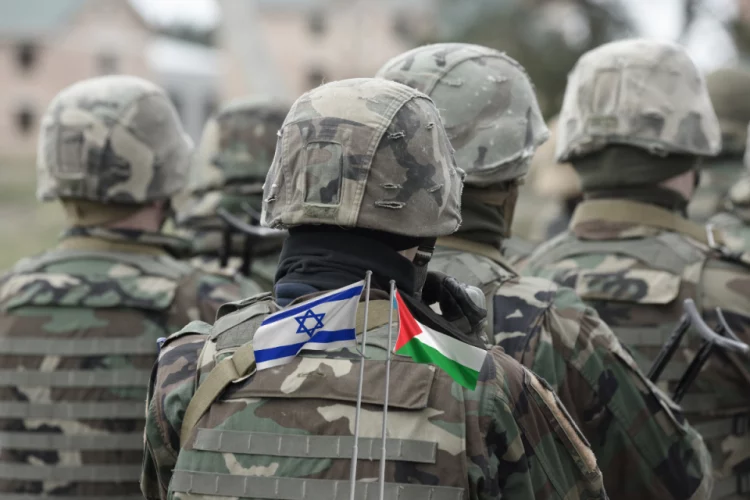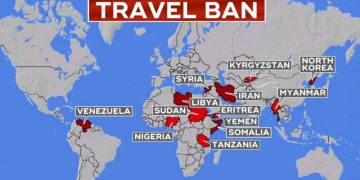A deadly attack has killed 21 Israeli soldiers in Gaza, the country’s military has said, a major setback that could add to mounting calls for a cease-fire.
The soldiers were preparing explosives to demolish two buildings in central Gaza on Monday when a terrorist fighter fired a rocket-propelled grenade at a tank nearby, according to Israeli media reports overnight.
The blast triggered the explosives, causing the buildings to collapse on the soldiers, killing 21 – the largest single loss of life for the Israeli military since the war began.
Defense Minister Yoav Gallant said it was a ‘difficult and painful morning,’ but that Israel was committed to pressing ahead.
‘This war will determine the future of Israel for decades to come, and the fall of soldiers is a requirement to achieve the goals of the war,’ he wrote on X.
Israeli military spokesman Rear Admiral Daniel Hagari told reporters the IDF was ‘investigating the details of the event and the reasons for the explosion.’
According to a website run by the IDF which posts details on fallen soldiers, those killed in the attack were from the 261st Infantry Brigade – a unit of reserves within the Israeli army’s Gaza Division, and the 205th division – a reserve armour brigade.
The deadly attack came as Israeli forces continued to probe deeper into western Khan Younis, the largest city in the south of the Gaza Strip.
Reports said the operation included the storming of a hospital and the arrest on medical staff, Gaza health ministry spokesman Ashraf al Qidra told Reuters.
Earlier on Monday, the IDF said three soldiers were killed in a separate incident in southern Gaza, taking the total IDF death toll for the day to 24.
Israeli Prime Minister Benjamin Netanyahu has vowed to press ahead until Isael crushes the ruling Hamas terrorist group and wins the freedom of more than 100 hostages held captive in Gaza.
Israelis are increasingly divided on the question of whether it is possible to do either.
Families of the hostages and many of their supporters have called for Israel to reach a ceasefire deal, saying time is running out to bring the hostages home alive.
On Monday, dozens of hostages’ relatives stormed a parliamentary committee meeting, demanding a deal to win their loved ones’ release.
Monday’s heavy death toll could add new momentum to calls for Israel to pause the offensive or even halt it altogether.
Large numbers of Israeli casualties have put pressure on Israel’s government to halt past military operations.
News of the attack came as a senior Egyptian official said Israel has proposed a two-month cease-fire in which the hostages would be freed.
In exchange, Palestinians imprisoned by Israel and top Hamas leaders in Gaza would be released and be allowed to relocate to other countries.
The official, who was not authorised to brief media and spoke on condition of anonymity, said Hamas rejected the proposal and is insisting that no more hostages will be released until Israel ends its offensive and withdraws from Gaza.
Israel’s government declined to comment on the talks when approached by the Associated Press, the news agency reported.
The official said Egypt and Qatar, which have brokered past agreements between Israel and Hamas, were developing a multistage proposal to try and bridge the gaps.
Israel launched the offensive after Hamas’ October 7 cross-border attack that killed over 1,200 people and abducted some 250 others.
The offensive has caused widespread destruction, displaced an estimated 85% of Gaza’s population and left more than 25,000 Palestinians dead, according to health officials in the Hamas-run territory.
The UN and international aid agencies say the fighting has unleashed a humanitarian disaster with a quarter of the area’s 2.3 million people facing starvation.
The war has also heightened regional tensions, with Iran-backed groups in Lebanon, Syria, Iraq and Yemen attacking US and Israeli targets in support of Palestinians.
The US and Britain launched another wave of strikes Monday against the Houthi rebels in Yemen, who have targeted international shipping in the Red Sea in what they portray as a blockade of Israel.
The growing death toll and dire humanitarian situation have led to increasing international pressure on Israel to scale back the offensive and agree to a pathway for the creation of a Palestinian state after the war.
The US, which has provided crucial military aid, has joined those calls.
But Netanyahu, whose popularity has plummeted since October 7 and whose governing coalition is beholden to far-right parties, has rebuffed both demands.
Instead, he has said Israel will need to expand operations and eventually take over the Gaza side of the border with Egypt, where hundreds of thousands of Palestinians who have fled from other areas are packed into overflowing UN-run shelters and sprawling tent camps.
That drew an angry protest from Egypt’s government, which rejected Israeli allegations that Hamas smuggles in weapons across the heavily guarded frontier.
Source: DAILY MAIL













